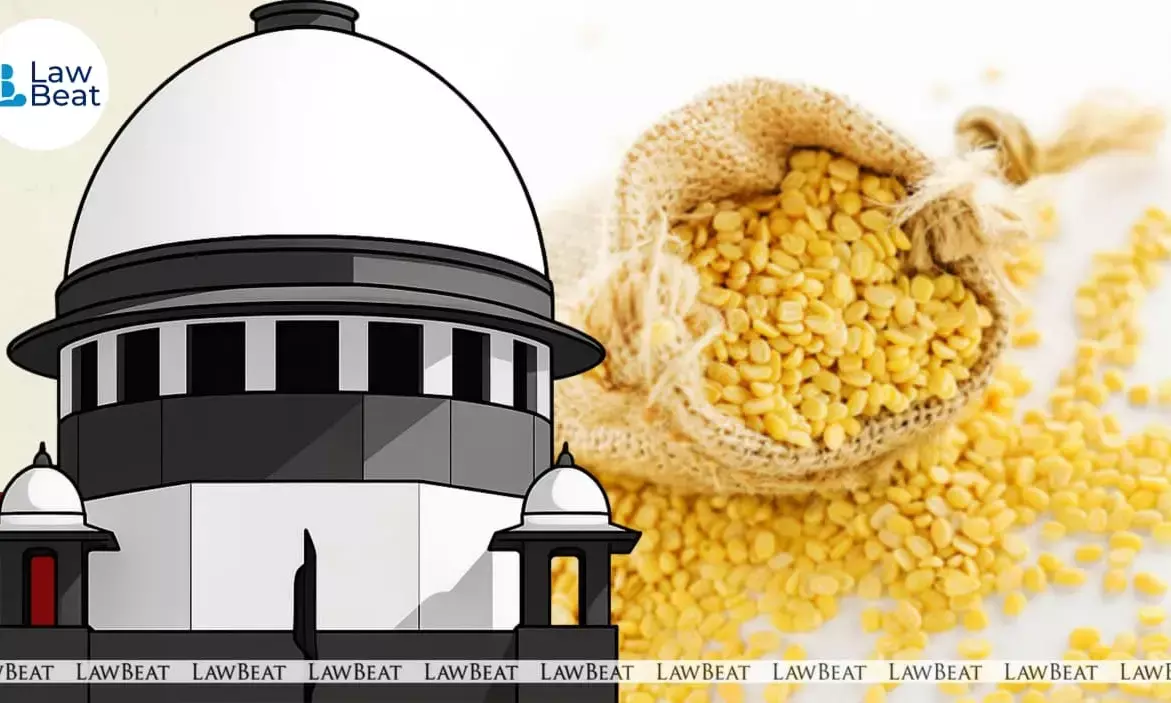Farmers vs Imports: Supreme Court Seeks Centre’s Reply on Yellow Pea PIL

SC issues notice to Union of India over unrestricted yellow pea imports
The Supreme Court on Thursday issued notice to the Union of India in a Public Interest Litigation (PIL) challenging the government’s policy of unrestricted imports of yellow peas, a substitute for traditionally grown Indian pulses such as arhar and chana.
The Bench of Justices Surya Kant, Ujjay Bhuyan, and N. Kotiswar Singh, took cognizance of claims that excessive imports have severely depressed domestic prices, harming farmers’ livelihoods.
The petitioners highlighted that the landed cost of yellow peas in India is approximately Rs. 3,500 per quintal, less than half of the Minimum Support Price (MSP) of domestically grown pulses, which hovers around Rs. 8,000 per quintal. This price disparity is forcing Indian farmers to sell their produce at significantly lower prices, disincentivizing cultivation and threatening domestic pulse production.
Represented by Advocates Prashant Bhushan and Neha Rathi, the petitioners relied on reports from government bodies including the Commission for Agricultural Costs and Prices (CACP) and Niti Aayog. Both bodies have warned that unrestricted imports of yellow peas distort the domestic market and recommended an outright ban to protect farmers and boost indigenous pulse production.
The PIL by Kisan Mahapanchayat challenges Notification No. 16/2025-26 dated 31 May 2025 issued by the Directorate General of Foreign Trade (DGFT), which permits duty-free import of yellow peas until 31 March 2026. The petitioners argue that the notification is arbitrary and irrational, extending a policy originally intended for only a three-month period under Notification No. 50/2023 issued on 8 December 2023. Seven consecutive notifications have effectively allowed continuous “free” imports since December 2023.
The petition cites that in 2024, India imported a record 6.7 million tonnes of pulses, of which yellow peas accounted for around 2.9 million tonnes. Yellow peas, largely imported from countries like Canada, the US, and Australia, are primarily used as cattle feed abroad but have become a cheap substitute for Indian pulses.
According to the petition, this has caused domestic prices to fall far below MSP, contrary to the government’s own “Mission for Aatmanirbharta in Pulses” launched in February 2025 to enhance domestic production and ensure remunerative prices for farmers.
The CACP, in its March 2025 report, warned that low- or zero-duty imports of pulses during 2024-25 depressed market prices for tur, moong, urad, and other pulses. It recommended banning yellow pea imports and increasing duties on other pulses to incentivize domestic cultivation. Niti Aayog’s September 2025 report also emphasized that import dependence is unsustainable and stressed the need to expand domestic pulse production.
The petition relies on Sections 3 and 9A of the Foreign Trade (Development & Regulation) Act, 1992, which empower the government to regulate or restrict imports in the interest of domestic industry. The petitioner points to prior Supreme Court judgments, including Union of India v. Agricas LLP (2021) and Union of India v. Raj Grow Impex LLP (2021), where the Court recognized the need to protect domestic farmers from adverse effects of large-scale imports.
Even Agriculture Minister Shivraj Singh Chauhan has reportedly written to the Minister of Food and Consumer Affairs highlighting that continued duty-free imports of yellow peas have brought down domestic pulse prices, discouraging farmers from expanding pulse cultivation.
The petitioners’ prayer seeks either to set aside Notification No. 16/2025-26 or to read it down to align with MSP protections and expert recommendations, ensuring the protection of Indian farmers.
Case Title: Kisan Mahapanchayat v. Union of India & Ors.
Hearing Date: September 25, 2025
Bench: Justices Surya Kant, Ujjay Bhuyan, and N. Kotiswar Singh
